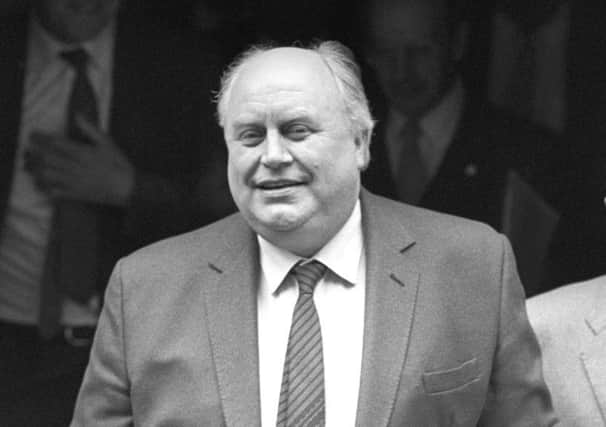Obituary: Norman Willis, trade union leader


Norman Willis, rotund, jolly and avuncular, was the boss of the Trades Union Congress during some of its most tempestuous years. When he became general secretary in 1984 (he held the job until 1993), membership was falling disastrously, hostile legislation was being introduced by the Thatcher government, the old links with the Labour Party were under stress, unemployment was rising and the miners were taking on the government in the bitterest long strike of the century.
Many people felt Willis was too amiable. He hated confrontation too much to rein in the hard Left, but he was far more shrewd than was often realised and was well versed in industrial law and bargaining. At the TUC, he was recognised for modernising its internal structure and building bridges with the European Union.
Advertisement
Hide AdAdvertisement
Hide AdNorman David Willis was the son of a barber and a laundry worker, both of whom were shop stewards. His family moved to Kent during the Second World War and Willis attended Ashford County Grammar School.
At 15, he started work as an office boy for the Transport and General Workers’ Union (TGWU) and after National Service he returned to work in the union’s education department. In 1955 he was awarded a place at Ruskin College, Oxford, to read philosophy and political science, completing his degree at Oriel College.
He then returned to Transport House, the TUC headquarters in London, as assistant to the firebrand union leader Frank Cousins. His dogged hard work was rewarded by promotion to head the research department, and a job as personal assistant to TGWU leader Jack Jones.
In 1974 he was appointed assistant general secretary of the TUC under Len Murray and a decade later, when Murray retired, became the general secretary during the hectic days of the miners’ strike. He tried to adopt a less bellicose and confrontational policy, travelling widely to offer help and bring warring factions together. He condemned all violence and the refusal by Arthur Scargill’s NUM to discourage such action. His pleas for purposeful talks seemed to fail at every attempt: Scargill’s intransigence and the government’s entrenched position made any settlement well-nigh impossible.
Willis eloquently pleaded for reason from both sides: “Violence creates more violence,” he said. “Such acts, if they are done by miners, are alien to our common trade-union tradition – not just because they were counter-productive but because they are wrong.”
Willis proved a canny operator and Mrs Thatcher wrote about their many meetings: “Norman Willis had pursued a thoroughly honourable line throughout,” she noted. “He had spoken to an NUM rally and there were attempts to shout him down and, in a chilling moment, a noose was lowered from the ceiling.” Willis had numerous meetings with the National Coal Board’s chairman, Ian MacGregor, who did at least listen to Willis’s determined efforts to promote peace in the pits.
Willis was instrumental in refashioning the TUC’s relations with the Labour Party. He worked closely with Labour leaders Neil Kinnock and John Smith to end the block vote and make the Labour Party conference more democratic.
At the 1987 general election, Willis and Kinnock proposed a more enlightened industrial agenda for the unions and made it known to the delegates that an incoming Labour government would not automatically repeal the Tory employment legislation. Willis also confirmed that ballots prior to strike action would remain legal.
Advertisement
Hide AdAdvertisement
Hide AdBut Willis’s time at the TUC became tortuous when the Wapping dispute broke out, followed by the strike at GCHQ. At the former, Willis was heavily involved in bringing the two sides together and in 1986 had secret meetings regarding the involvement of workers in Kinning Park in Glasgow who were being trained as print workers.
Willis was far from being an old-school union militant. In the miners’ strike, his calm resolve not to give into the militant factions restored the movement’s credibility with the public and laid the basis for constructive co-operation between management and the shop floor. Some have argued that it opened the door for New Labour.
Certainly, Willis was no unapproachable humourless diehard, and would often enliven evenings at the TUC Congress by breaking into song at the bar (his party piece was “I am the man, the very fat man, what waters the workers’ beer”). His enlightened policies and more reasoned arguments, it can be argued, changed the image of the unions and altered their place in industrial politics.
Willis retired to Norfolk in 1993 and spent his time painting watercolours, bird-watching, and doing embroidery. He was patron of the Embroiderers’ Guild and wrote for the CrossStitcher magazine. He married, in 1963, Maureen Kenning, who later worked as secretary to Neil Kinnock. They had a son and a daughter.